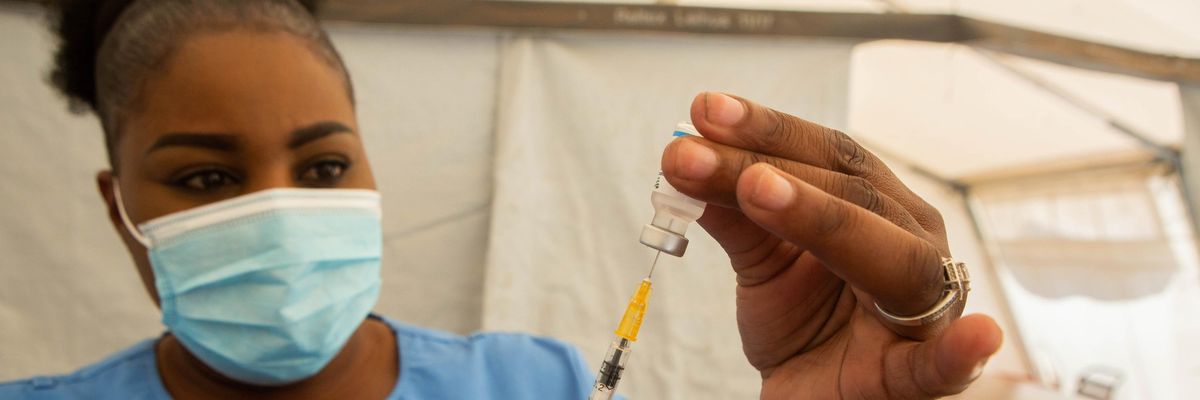With the new year approaching, World Health Organization Director-General Tedros Adhanom Ghebreyesus warned Wednesday that the end of the coronavirus pandemic will remain out of reach as long as low-income countries are denied the ability to widely vaccinate their populations.
Tedros lamented during his weekly press conference that 92 out of 194 WHO member nations are set to miss the 40% end-of-year vaccination target established by the international agency due to "a combination of limited supply going to low-income countries" and donated vaccine doses arriving "close to expiry and without key parts--like the syringes!"
"This is the time to rise above short-term nationalism and protect populations and economies against future variants."
"Forty percent was doable," said Tedros. "It's not only a moral shame, it cost lives and provided the virus with opportunities to circulate unchecked and mutate."
Much of the world is now dealing with the consequences of Covid-19's mutations as the highly transmissible Omicron variant, first detected in southern Africa last month, drives record infection increases across the globe. Vaccine equity advocates have long warned that leaving much of the world without access to vaccines would provide ample opportunities for the coronavirus to mutate, prolonging the pandemic indefinitely.
As the Associated Pressreported Wednesday "the number of Covid-19 cases recorded worldwide increased by 11% last week compared with the previous week, with nearly 4.99 million newly reported from December 20-26."
"New cases in Europe--which accounted for more than half of the total--were up 3% while those in the Americas rose 39% and there was a 7% increase in Africa," AP noted. "The global gain followed a gradual increase since October."
Though data out of South Africa and elsewhere has indicated that Omicron causes less severe disease than other coronavirus strains, Tedros cautioned Wednesday that the current "tsunami" of cases "will continue to put immense pressure on exhausted health workers and health systems on the brink of collapse."
"In the year ahead, I call for leaders of government and industry to walk the talk on vaccine equity both by ensuring consistent supply and helping to get vaccinations actually into people," Tedros said. "Vaccine supply, for now at least, is improving, although the emphasis on boosters in rich countries could cause low-income countries to go short again."
"I call on leaders of rich countries and manufacturers to learn the lessons of Alpha, Beta, Gamma, Delta, and now Omicron and work together to reach the 70% vaccination coverage," he continued. "This is the time to rise above short-term nationalism and protect populations and economies against future variants by ending global vaccine inequity."
In the year since the first coronavirus vaccine dose was administered outside of a clinical trial, more than nine billion Covid-19 shots have been given worldwide--but just 8.4% of people in low-income countries have received at least one dose, according to Our World in Data.
"Unless the world is vaccinated, the likelihood is there will be another variant that will be far more lethal."
Poor nations' inability to access Covid-19 vaccines has been attributed to a number of factors, from rich countries' hoarding of doses to the pharmaceutical industry's persistent refusal to share vaccine recipes that would allow developing countries to produce generic shots for their populations.
Wealthy nations--including the U.K., Germany, and Switzerland--have helped Big Pharma maintain its profitable stranglehold on vaccine production by stonewalling a proposed patent waiver at the World Trade Organization.
Advocacy groups, meanwhile, have accused the U.S. and other powerful countries of failing to adequately invest in global vaccine manufacturing. The Organization for Economic Cooperation and Development (OECD) estimated earlier this month that it would cost just $50 billion to vaccinate the world--a fraction of the $778 billion that the U.S. Congress and President Joe Biden authorized for military spending in the coming fiscal year.
Related Content
The Pentagon Just Got $778 Billion, But USAID Is Running Out of Money for Covid-19 Vaccines?
Brett Wilkins
In a recent op-ed, Peter Geoghegan and Anthony Barnett of openDemocracy noted that "the moment credible vaccines were developed we were informed that, for them to work, everyone needed to have them."
"Leave the poor and the crowded unvaccinated, we were told, and new variants would mutate that would find their way around the protections against the old ones," the pair wrote. "Meanwhile up pops Omicron to say: 'Told you so,' and it proves itself to be vertically contagious."
"Universal vaccination could have prevented the viral reproduction of Covid that generates such variations," they argued. "Now, unless the world is vaccinated, the likelihood is there will be another variant that will be far more lethal."


